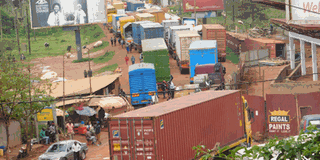Resolve deep-seated issues with Rwanda

Some of the cargo trucks stuck at the border.
When Rwanda restricted the movement of Rwandans into Uganda on Thursday, there was an outcry by Ugandans whose relatives on the other side of the border had been blocked from travelling to Uganda, and the pain felt by truckers who were blocked from accessing Rwanda through the Katuna-Gatuna was palpable.
In Kampala, on Friday, Rwandans living in Uganda issued a statement calling for the immediate reopening of the border point and a de-escalation of tensions between the two countries whose populations are heavily interconnected by blood, marriage and commerce.
Not as much noise came out of Rwanda, especially on social media, but Rwandans, especially those who were blocked from travelling to Uganda for whatever engagements they had, cannot have been pleased at the development. A lot of money must have been lost in the process.
What this shows is that the people on either side of the border are not prepared to let politicians on either side stand in the way of them forging even closer ties as the economies of the East African Community seek to integrate further. It is also important to note that the leaders of both countries have been on the forefront of promoting the EAC agenda – President Museveni just handed over the leadership of the EAC to Rwanda’s Paul Kagame.
If the EAC is to succeed, the politicians know very well that it is important to proactively manage all possible sources of conflict among the countries concerned regardless of whether the concerned leaders like one another or not. The respective countries and the integration project – the hundreds of millions of people involved – are greater than the ambitions of any leader or group.
There is, therefore, need for a frank conversation about what it is that has led to lukewarm and often bad relations between Uganda and Rwanda. None of the countries has fully explained what the exact issues are that have caused the disquiet – not even President Kagame of Rwanda sufficiently broke down the issues in his interview with The East African mid-February.
Those running the governments will argue that bilateral relations cannot be managed in the public domain, but if this argument is to be granted, it must follow that the secretive methods that have been applied so far work effectively.
The evidence is that they haven’t – the two countries have not come back to true brotherly relations since the shootouts in Kisangani, DR Congo, in 1998.
Whatever the concerned leaders do, therefore, there is need to work to resolve the deep-seated issues that cause these tensions.




